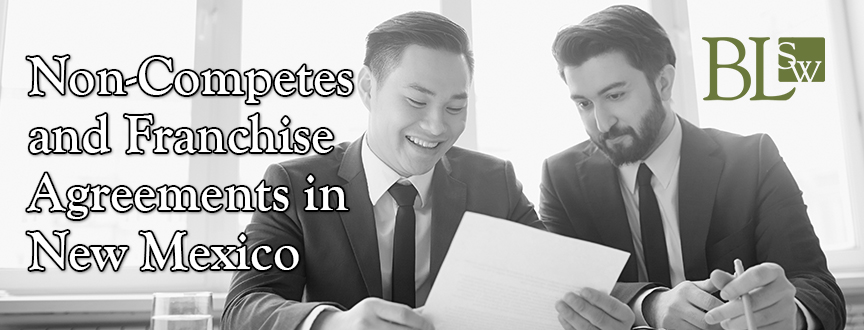I cannot tell you how many franchisees I know come to me a couple years after having signed an agreement desperate to get out of it. Franchisors love to make fantastic promises about growth and potential, but when you look at the fine print, what you’ll learn is they place all the risk on the franchisee – and make it very difficult and costly to fight. To all readers out there considering entering into a franchise, let this be a lesson for you: Do not enter into a franchise lightly, and please make sure you have an attorney you trust review the franchise agreement, answer your questions and explain what could go wrong. There are many things to consider when signing a franchise agreement but for the sake of this blog, lets focus on the issue of Non- competes. Let’s assume your franchise agreement does have a non-compete clause and you currently operate a franchise in New Mexico. Let’s also assume you want out of your franchise agreement but still wish to live in the area that your franchise was in. Here is where things can get tricky. For example, if your franchise agreement indicates you cannot do business within 300 miles of the franchise should you chose to end the agreement, this could dramatically limit where you live and your ability to do business.
First, is a non-compete even valid? Second, if it is valid, is it enforceable?
The answer to both questions will depend on the “choice of law” provisions of your franchise agreement. Even though your franchise is in New Mexico, it’s possible your franchise agreement would apply the law of a different state to your non-compete. If this is the case, and your franchise agreement is based on the law of a state other than the one you are currently doing business in, you should consult with an attorney located in the state that applies. If we assume your franchise agreement relies on New Mexico law, then you need to know that non-compete agreements are enforceable in New Mexico if they are “reasonable”. There is no black-and-white test on what is or is not reasonable, but courts look for limitations in scope, typically in time and geography. Therefore, non-compete agreements that last “indefinitely” will almost certainly be viewed as unenforceable in New Mexico.
What issues can happen with non-compete agreements?
Similarly, non-compete agreements that have no restrictions in geographic scope will also usually be viewed as unenforceable. The lack of an expiration on a non-compete can represent one of two issues, both that could be in your favor. First, if there’s no expiration language at all relating to the non-compete, it may represent faulty language that permits us to claim the non-compete terminates when the franchise agreement terminates. Otherwise, second, if the language in the non-compete says it never expires, then we could argue the non-compete is not reasonably construed and therefore unenforceable. There are several options available to you. First and foremost, try to negotiate with the franchisor. Some franchisors would rather negotiate than fight, and I’ve seen franchisors willing to make exceptions or redefine the non-compete restriction in a way that still protected the franchise but provided an opportunity for the former franchisee to provide competitive services in the local community. If you are getting nowhere in negotiating with the franchisor, but you believe the non-compete is not “reasonable,” then instead of simply breaching the non-compete and possibly exposing yourself to a damage claim by the franchisor, you can instead sue the franchisor and seek what’s called “declaratory judgement”. This would ask the court to weigh in on the enforceability of the non-compete clause before you break it, therefore giving you a legal mechanism to determine whether it’s safe to ignore the non-compete.

Finally, there is an issue that is untested in New Mexico: Specifically, can a non-compete that may be considered “reasonable” on its face (assuming for the moment, reasonable expiration language), be rendered unreasonable by the business practices of the franchisor – because they are selling so many franchises, they effectively render the geographic scope unreasonable. Would it be considered unreasonable to be restricted from practicing in NM or the southwest for that matter? Possibly, especially if you were a medical or dental practice. If you own a franchise and the franchisor is unwilling to negotiate with you, I would strongly recommend you consider a declaratory judgement action, if you feel you’re in such a circumstance.
Contact us or give us a call at 505.848.8581
Business Law Southwest.
Business Law That Makes Business Sense.
A Slingshot company.






